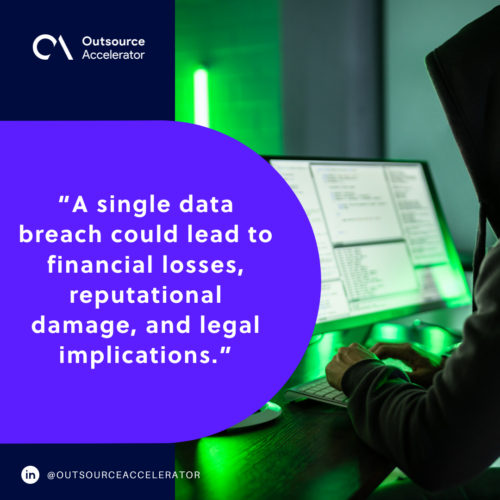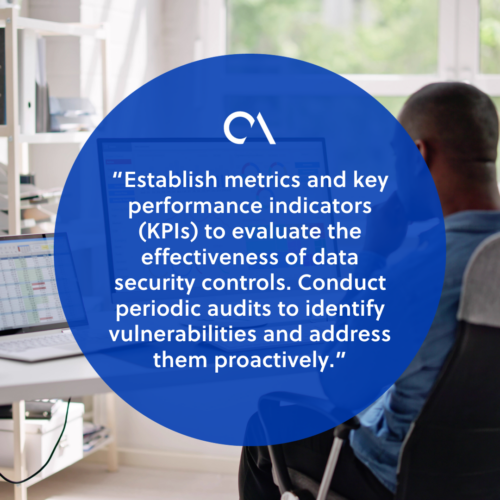5 tips to ensure data security in outsourcing

Organizations often outsource services to streamline their processes and gain a competitive edge.
On the other hand, it’s natural for new and existing clients to worry about the security of their functions, especially in data. Statista’s survey revealed that almost 2,000 breaches happened in the US alone in 2022, with 422 million data exposed.
Data security in outsourcing should be a priority for both the client and service provider to prevent breaches and other issues.
SixEleven shares the essential tips to help businesses ensure data security in outsourcing.
Importance of data security in outsourcing
Businesses must prioritize data security throughout the outsourcing process.
When a company decides to outsource its business processes, it entrusts sensitive data to a third-party provider. This data may include:
- Financial records
- Customer information
- Trade secrets
- Valuable assets
Any breach or compromise of data can have severe consequences. A single data breach could lead to financial losses, reputational damage, and legal implications.
This is why service providers must implement security measures.

Challenges faced when ensuring data security
Outsourcing comes with inherent challenges that can potentially compromise data security. These challenges include:
1. Cyber threats: The digital landscape is rife with cybercriminals constantly evolving tactics to exploit vulnerabilities. Outsourcing service providers must have robust cybersecurity measures to protect against these threats.
2. Legislative differences: Outsourcing often involves working with teams from countries or regions with varied data privacy and security laws. This can impact data security practices, such as attitudes toward privacy and confidentiality.
3. Data transfer and storage: When data is transferred between the company and the outsourcing provider or stored in external systems, there is a risk of interception or unauthorized access.
4. Vendor selection: Businesses should thoroughly evaluate the vendor’s reputation, track record, and data security standards to ensure they can be trusted with sensitive information.
5 tips to ensure data security in outsourcing services
From administrative tasks such as data entry to more complex work, ensuring security for their information should be paramount to their priorities when delegating services.
To help businesses guarantee data security in outsourcing, here are five essential tips to consider:
1. Define data security requirements
Before entering an outsourcing agreement, clearly define your data security requirements and expectations. This includes specifying encryption standards, access controls, data backup procedures, and incident response protocols.
Ensure that these requirements are clearly communicated to the outsourcing vendor and documented in the agreement.
2. Conduct vendor due diligence
Thoroughly vet potential outsourcing vendors to ensure they have robust data security measures. Evaluate their certifications, industry reputation, and previous clients’ feedback regarding data security.
For instance, service providers handling accounting and other finance-related services should be at least PCI-DSS compliant to protect financial information.
A trustworthy vendor will be transparent about their security protocols and compliance with industry standards.
3. Implement strong access controls
Implement strong access controls to ensure only authorized individuals can access sensitive data. This includes two-factor authentication, role-based access controls, and regular audits of user privileges.
Limiting access to a need-to-know basis significantly reduces the risk of data breaches.
4. Regularly monitor and audit data security
Data security is an ongoing process; regular monitoring and auditing are essential.
Establish metrics and key performance indicators (KPIs) to evaluate the effectiveness of data security controls. Conduct periodic audits to identify vulnerabilities and address them proactively.
Regularly reviewing access logs and conducting penetration tests can help identify and fix weak points in the security infrastructure.

5. Maintain data security awareness
Data security is not just the responsibility of the outsourcing provider. It is crucial to maintain data security awareness throughout the organization.
Conduct regular training sessions to educate employees about data security best practices. Encourage the reporting of any suspicious activities or potential security breaches, fostering a culture of vigilance and accountability.
SixEleven’s standards for data security in outsourcing
SixEleven understands the significance of data security in the outsourcing industry.
With years of experience in outsourcing, SixEleven has developed robust data security protocols to protect clients’ sensitive information.
It prioritizes strong access controls, encryption standards, and regular security audits to ensure the confidentiality and integrity of data.
Organizations can mitigate the risks associated with outsourcing and safeguard their sensitive information by following the five tips mentioned above. Another effective solution is partnering with a reputable outsourcing provider like SixEleven.
Visit SixEleven’s website to learn more about its commitment to data security and explore its comprehensive range of outsourcing services!







 Independent
Independent




